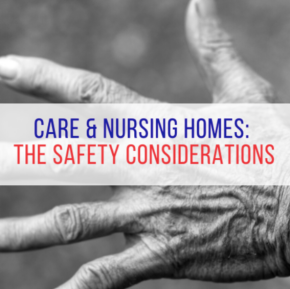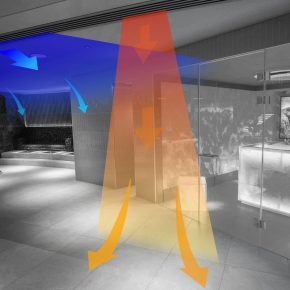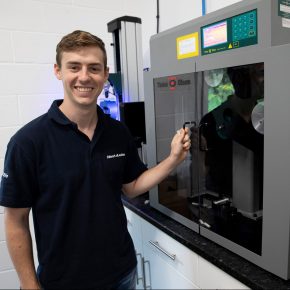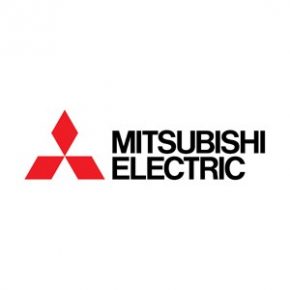
Care & nursing homes: the safety considerations
Contour explores important factors worth considering when it comes to radiators in care and nursing homes.
In all healthcare and residential environments, safety is a driving factor in the types of resources you choose to specify.
Factors such as the location of the radiator, radiator surface temperature, ease of access for cleaning and product safety features all need consideration. Safety and well-being for residents help contribute to a comfortable and happy living experience, and a poorly specified radiator may present a potential risk of injury, or worse.
Risk of burn is a key issue in environments that house vulnerable individuals. Back in 2010, alarming figures emerged, stating that 1,970 people were injured in a public building due to contact with a radiator or section of hot pipework. As a result, the government recommends that you choose radiators that don’t exceed a temperature of 43 °C.
Considering that standard panel radiators could reach up to 80 °C, care and nursing homes have a duty to specify appropriate radiators for their residents.
The Problems With Current Radiators
Contour has found that standard radiators and guards have been proven to be a poor fit for care and nursing homes.
There are several reasons for this:
– Non-access covers
– LSTs made from multiple pieces of metal that make it hard to take apart and assemble again after cleaning and maintaining.
– Weak materials such as 1.2mm steel that are easily damaged
– Covers made from MDF that absorb the heat due to their design and thermal properties.
What Are Your Options?
With a variety of radiator guards on the market, Contour recommends that you bear certain considerations in mind. Whilst radiator guards reduce the surface temperature, they do affect the heating efficiency.
Contour’s DeepClean LST radiator guards reduce heating efficiency by only 11%. Contour recommends that you be mindful of the reduction of heat efficiency before making your final decision. Radiator guards will have varying levels of efficiency reduction.
Low Surface Temperature (LST) radiators are a versatile and safe option, designed to prevent injury in the event of accidental contact. Plus, Contour’s casing options can be used to conceal exposed valves and pipework, often visible in older buildings.
Whilst radiator surface temperature is arguably the most important safety feature of our radiator range, Contour aims to go beyond the obvious risks, taking a more holistic viewpoint.
In addition, bullnose corners and radius edges mean that the casing of the radiator and cover are as risk-free as possible.
The radiators also make cleaning quick and simple, providing the ideal solution for environments where immune systems are compromised. Contour’s DeepClean LST radiators have been designed to make the cleaning process as efficient and effective as possible. For full instructions on how to clean an LST radiator, click here.
Again, with vulnerable residents, the risk of bacteria spreading could pose a severe health risk. As one of the only manufacturers in the UK to incorporate BioCote antimicrobial technology in the paintwork of every radiator and guard, Contour can confidently say that risk of bacteria spreading is greatly minimised. Read more about BioCote’s technology here.
Contour’s LST radiators and guards don’t just reduce the risk of burning; they are beneficial to care and nursing homes for numerous purposes.
Contour can be contacted at;
The Mansions
43 Broadway
Shifnal
TF11 8BB
Tel: 01952 290 498
Email: sales@contourheating.co.uk
Visit Supplier's page
Latest news

1st April 2025
Gilberts Takes Thermal Comfort to New Heights
Gilberts Blackpool is continuing to build on its reputation as a pioneer with the unveiling of ThermaAstute™ – the most extensive range of thermally sensitive diffusers in the market.
Posted in Air Conditioning, Articles, Building Industry News, Building Products & Structures, Building Services, Facility Management & Building Services, Heating, Ventilation and Air Conditioning - HVAC, Innovations & New Products, Restoration & Refurbishment, Retrofit & Renovation, Sustainability & Energy Efficiency
1st April 2025
University of Bath Student Helps Vent-Axia Win Two Environmental Industry Awards
Leading ventilation manufacturer, Vent-Axia, is delighted that the valuable work University of Bath student Roben Els undertook during an industry placement at the company contributed to it winning two environmental industry awards.
Posted in Air Conditioning, Articles, Awards, Building Industry Events, Building Industry News, Building Products & Structures, Building Services, Heating, Ventilation and Air Conditioning - HVAC, Recruitment, Retrofit & Renovation, Sustainability & Energy Efficiency, Training
1st April 2025
Ahmarra: Fire Doors Designed for Hospitals & Healthcare Environments
Ahmarra is a leading UK specialist in fire doors for healthcare environments, having manufactured and installed thousands of bespoke doorsets for NHS hospitals across London and the South East.
Posted in Access Control & Door Entry Systems, Accessibility, Acoustics, Noise & Vibration Control, Architectural Ironmongery, Articles, Building Industry News, Building Products & Structures, Building Services, Building Systems, Doors, Facility Management & Building Services, Health & Safety, Interior Design & Construction, Interiors, Restoration & Refurbishment, Retrofit & Renovation, Security and Fire Protection, Timber Buildings and Timber Products, Wooden products
1st April 2025
Mitsubishi Electric: New intuitive, IoT-ready centralised controller offers instant access to 400 units
Mitsubishi Electric has launched a new user-friendly, touchscreen controller to offer full remote controllability, monitoring and reporting for up to 400 air conditioning units.
Posted in Air Conditioning, Articles, Building Industry News, Building Products & Structures, Building Services, Facility Management & Building Services, Heating Systems, Controls and Management, Heating, Ventilation and Air Conditioning - HVAC, Information Technology, Innovations & New Products, Pipes & Fittings, Plumbing, Posts, Research & Materials Testing, Retrofit & Renovation, Sustainability & Energy Efficiency
 Sign up:
Sign up: